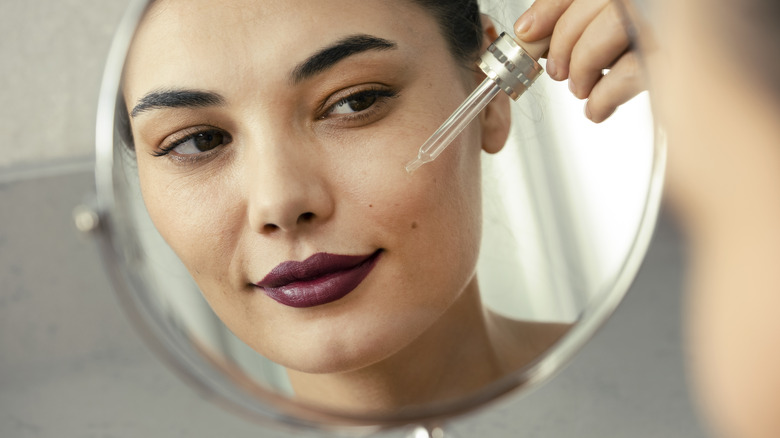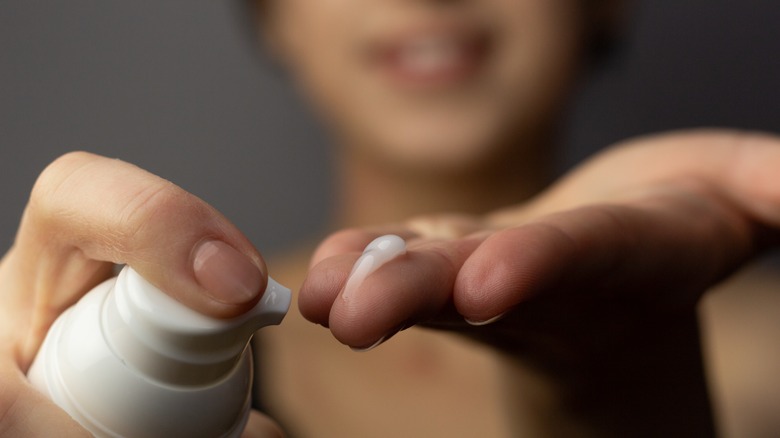Does Retinol Cause Skin Cancer? What To Know About This Go-To Skincare Solution
Retinol is an ever-popular ingredient that's a must-have for any skincare routine. Overall, it can renew your complexion for the better. Made from Vitamin A, using retinol has anti-aging benefits and can combat acne. It can also minimize pores and treat skin conditions like psoriasis.
Dermatologist Dr. Nancy Samolitis explained to Forbes how retinol molecules work when the ingredient is applied to the skin. She said, "The molecule penetrates into the cells and stimulates cell turnover. When skin cell turnover is maximized, the cells are able to function at their optimal capacity and repair DNA damage caused by the sun and environmental stressors." Samolitis continued, "This repair and cell normalization, in turn, leads to improvement in signs of aging such as dullness, discoloration, fine lines, and uneven texture."
Experts say that the best time to start using retinol is when you're in your 20s. If this ingredient is new to you, apply a small amount after cleansing and drying your face, and make sure to moisturize after. While it's recommended that you use retinol daily, dermatologist Whitney Bowe told Vogue that you should begin by using it no more than twice a week to decrease the chances of irritation. Another thing to keep in mind? You should always use sunscreen after retinol.
Retinol and the sun don't mix
Although retinol has a prestigious reputation, there is a caveat. Dr. Whitney Bowe revealed to Vogue, "Retinol makes your skin more sensitive to UV rays and sunlight decreases the efficacy of the product." This can lead to sun damage, also known as photodamage. Moreover, when you use retinol, there is a chance the skin could become irritated or inflamed. Per Healthline, spending time in the sun can exacerbate these side effects.
Deborah S. Sarnoff, MD, from the Skin Cancer Foundation, explained why this occurs and said, "When you remove dead skin cells and expose the new, more delicate skin underneath, your skin becomes more susceptible to damage from UV rays." Experts say that to avoid this, you should apply your retinol before bed. To prevent photodamage or photoaging, you should wear sunscreen with an SPF of 30 or higher daily while using retinol. That said, retinol does not cause skin cancer.
However, if you choose not to wear sunscreen with retinol, the consistent photodamage could eventually cause skin cancer. Unsurprisingly, tanning while using retinol without sunscreen is also not a good idea. But this should not deter you from incorporating retinol in your skincare routine or using it during the summer. All you need to do is ensure you have sunscreen and reapply it consistently. If you're going on vacation and plan to spend most of your time outdoors, refrain from using retinol during that time.
Research shows that retinoids can combat skin cancer
Still wary of retinol and the sun? Dermatologist Stacy Chimento told Real Simple that besides using sunscreen, "Wear protective clothing like hats and long sleeves" and "stay in the shade whenever possible." Whether you apply retinol at night or in the morning, wash it off before spending time in the sun. If your retinol frequently irritates your skin, consider switching to another product. Whitney Bowe told Vogue that retinol beginners should opt for a product that has between .01% to 0.03% concentrations. And despite the ramifications of going sunscreen-free while wearing retinol, research demonstrates that retinoids can actually help to prevent skin cancer.
Retinoids is an umbrella term used to describe skincare ingredients that come from Vitamin A. Thus, retinol is considered to be a retinoid. According to Nurx, retinoids were found to decrease squamous cell carcinoma formation (but there's no word if it can do the same for melanoma). Squamous cell carcinoma commonly appears on the face and resembles a wart or sore. Nurx explains that retinoids work against skin cancer because they can trigger the creation of new cells. However, the American Cancer Society states that retinoids are not used in cancer prevention because it's believed they can cause birth defects.


